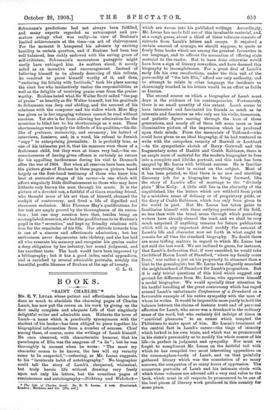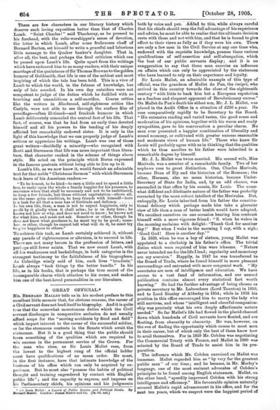BOOKS.
Ma•. E. V. LUCAS, whose patient and affectionate labour has done so much to elucidate the charming pages of Charles Lamb, has now put the crown on his work by giving us the first really complete and adequate Life of that singularly delightful writer and admirable man. Hitherto the lover of Lamb—a name which is practically synonymous with the student of his books—has been obliged to piece together his biographical information from a number of sources. Chief among these, of course, come the writings of Lamb himself. He once observed, with characteristic humour, that his pseudonym of Elia was the anagram of "a lie"; but he was thoroughly in earnest when be wrote : " The more my character comes to be known, the less will my veracity come to be suspected,"—referring, as Mr. Lucas suggests, to his " inveterate habit of autobiography." No biographer could tell the story of Lamb's chequered, whimsical, but truly heroic life without drawing very freely upon not only his lettere, but the countless pages of reminiscence and autobiography—Dichtung und Wahrheit- • The Life of Charles Lamb. By E. V. Lucas. 2 vols. illustrated. London : Methuen and Co. [21s. net.]
which are woven into his published writings. Accordingly, Mr. Lucas has made full use of this invaluable material, and, at a rough guess, about a third of these volumes consists of extracts from Lamb's letters and essays. It required a certain amount of courage, we should suppose, to quote so freely from books which are among the greatest favourites in our language, and to affront the accusation of offering stale material to the reader. But to have done otherwise would have been a sign of literary cowardice, and have doomed this biography to incompleteness. For a great deal of Lamb's early life his own recollections, under the thin veil of the personality of " the late Elia," afford our only authority, and to attempt to relate in other language the incidents so charmingly touched in his letters would be an effort as futile as Icarian.
The second source on which a biographer of Lamb must draw is the evidence of his contemporaries. Fortunately, there is no small quantity of this extant. Lamb seems to have interested and fascinated his friends as much as he interests and fascinates us who only see his virile, humorous, and pathetic figure moving through the haze of three generations, and nearly all of them left some more or less illuminative picture of the impression which be produced upon their minds. From the memorials of Talfourd—who could have given us an ideal biography, if he had ventured to write with the outspoken veracity of Boswell or Lockhart —to the sympathetic sketch of Barry Cornwall and the fragmentary notes of Hazlitt and Crabb Robinson, there is an ample mass of material for the modern biographer to fuse into a complete and lifelike portrait, and this task has been essayed by Mr. Lucas with brilliant success. He is familiar with everything that is extant on the subject. Most of it has been printed, so that there is no new and startling discovery left for a biographer to bring forward, like the story of Lamb's offer of marriage to the " divinely plain " Miss Kelly. A little still lies in the obscurity of the unpublished, like the letters which are withheld from print• by a mistaken sense of delicacy or of proprietary pride, or the diary of Crabb Robinson, which has only been given to the world in part. But Mr. Lucas has taken pains to familiarise himself with these outlying portions of his field, no less than with the broad areas through which preceding writers have already cleared the road, and we shall be very much surprised if anything remains for future publication which will in any important detail modify the account of Lamb's life and character now set forth in what ought to remain for all time the standard biography. No doubt there are some trifling matters in regard to which Mr. Lucas has not said the last word. We are inclined to guess, for instance, that Lamb's declaration that, if ever ennobled, he would take the title of Baron Lamb of Stamford, " where my family come from," was rather a jest on his propensity to stammer than a hint to the genealogist; but Mr. Lucas has diligently searched the neighbourhood of Stamford for Lamb's progenitors. But it is only' trivial questions of this kind which suggest any ground for difference from Mr. Lucas, who approves himself a model biographer. We would specially draw attention to his tactful handling of the great controversy which has raged around Lamb's unfortunate Confessions of a Drunkard as a favourable example of his entire sympathy with the man of whom he writes. It would be impossible more justly to hold the balance between the claims of historic truth and of personal affection for Lamb, who never was a drunkard in the ordinary sense of the word, but who certainly did indulge at times in "convivial pleasures" to an extent which tempted the Philistines to make sport of him. Mr. Lucas's treatment of the central fact in Lamb's career—the tinge of insanity which lurked in his own brain, and which was so pronounced in his sister's personality as to modify the whole course of his life—is perfect in judgment and sympathy. Nor must we forget to compliment Mr. Lucas on the faithful toil with which he has compiled two most interesting appendices on the commonplace-books of Lamb, and on that painfully gathered library which was the consolation of so many sorrows, the companion of so many hours of oppression. The numerous portraits of Lamb and his intimate circle with which these volumes are adorned add a very real value to the book, which must in all respects be pronounced to be one of the best pieces of literary work produced in this country for some years.
deserve such loving exposition better than that of Charles Lamb. " Saint Charles !" said Thackeray, as he pressed to his forehead, with the relic-worshipper's sense of devotion, the letter in which Lamb, after some frolicsome chaff of Bernard Barton, set himself to write a graceful and laborious little message to the Quaker banker's daughter. That is, after all, the best, and perhaps the final criticism which can be passed upon Lamb's life. Quite apart from the writings which have endeared him to so many readers, with their unique marriage of the quaintness of Sir Thomas Browne to the golden humour of Goldsmith, that life is one of the noblest and most inspiring of which the tale has been told. This is a view of Lamb to which the world, in the fulness of knowledge, has only of late acceded. In his own day outsiders were not competent to judge of the duties which he fulfilled with so touching and unambitious a self-sacrifice. Coarse critics like the writers in Blackwood, self-righteous critics like Carlyle, were not able to see through the surface film of persiflage—often ill-timed—and freakish humour in which Lamb deliberately concealed the central faot of his life. That fact, of course, was that he had from an early time devoted himself and all his powers to the tending of his deeply afflicted but remarkably endowed sister. It is only in the light of this knowledge that we can properly judge of Lamb's actions or appreciate his writings. Lamb was one of those great writers—decidedly a minority—who recognised with Scott and Stevenson that life was more important than litera- ture, that character ranked in the scheme of things above style. He acted on the principle which Burns expressed in the famous quatrain without being able to live up to it. Lamb's life, as we now know it, would furnish an admirable
text for that noble " Christmas Sermon" with which Stevenson -took leave of his American readers :— "To be honest, to be kind—to earn a little and to spend a little less, to make upon the whole a family happier for his presence, to renounce when that shall be necessary and not to be embittered, to keep a few friends, but these without capitulation—above all, on the same grim condition, to keep friends with himself—here is a task for all that a man has of fortitude and delicacy In his own life, then, a man is not to expect happiness, only to profit by it gladly when it shall arise; he is on duty here ; he knows not how or why, and does not need to know ; he knows not for what hire, and must not ask. Somehow or other, though he does not know what goodness is, he must try to be good ; some- how or other, though he cannot tell what will do it, he must try to give happiness to others."
To achieve this task, as Lamb certainly achieved it, without any parade of righteousness or altruism, is to succeed in life. There are not many heroes in the profession of letters, and perhaps still fewer saints. That we now count Lamb, with all his weaknesses and backalidings, in both categories is the strongest testimony to the faithfulness of his biographers. As Coleridge wisely said of him, such lives "irradiate." Lamb always "took things by the better handle." In his life, as in his books, that is perhaps the true secret of the incomparable charm which attaches to his name, and makes him one of the best-loved personalities in our literature.



















































 Previous page
Previous page